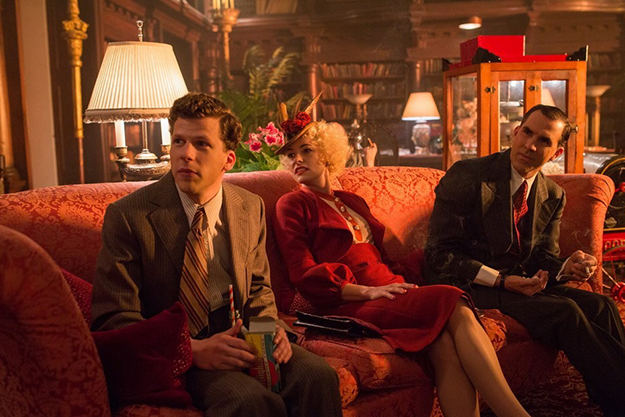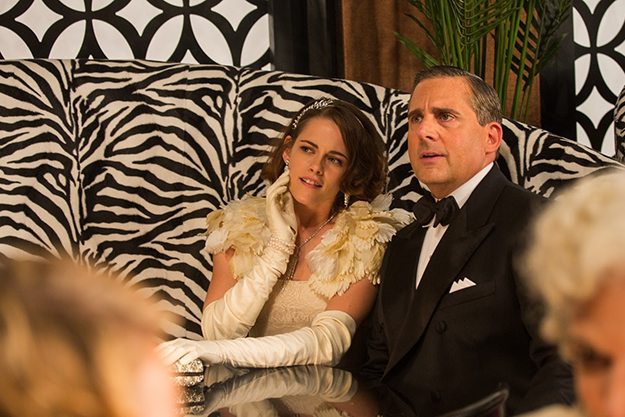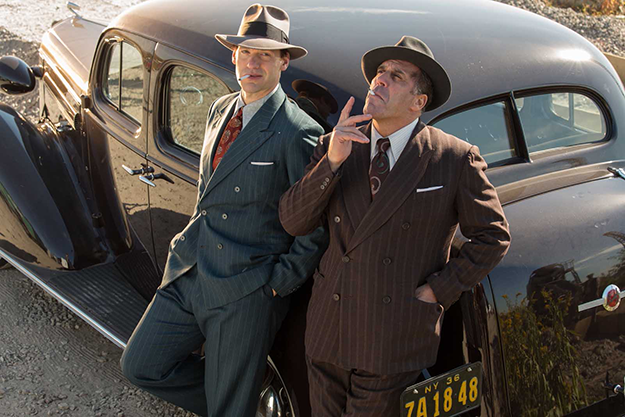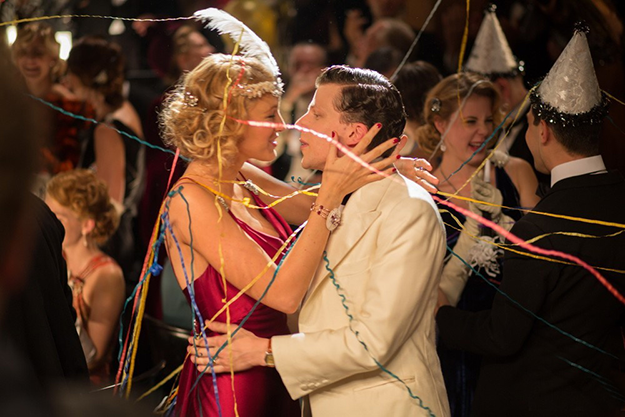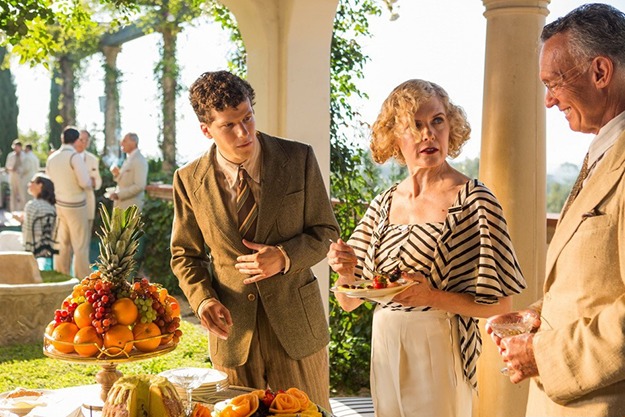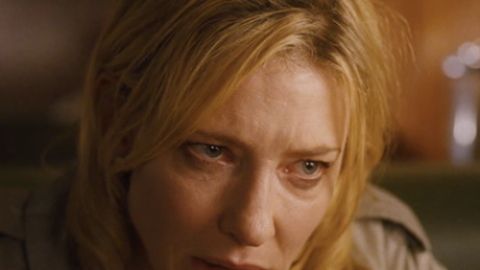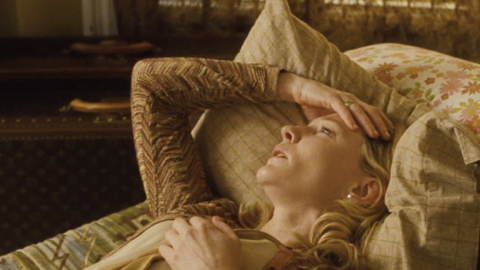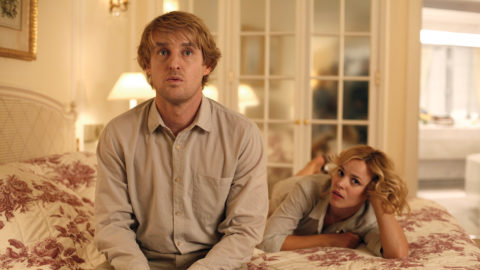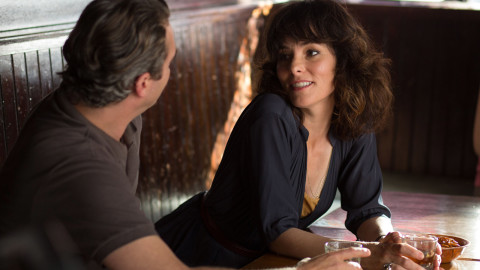Film of the Week: Café Society
As a filmmaker, Woody Allen tends increasingly to be a short-story writer, but now and then he reveals his hankering to be a novelist. His work, especially of late, often hangs on a single simple premise—an American tourist slips through a hole in time, a debunker of magic falls for a beautiful mystic, a jaded philosopher puts his Nietzschean principles to the practical test—and, for better or worse, exploits that premise for whatever comic or dramatic grist it can.
But every now and then, the novelistic aspirations emerge, and Allen expands his stories in parallel subplots that don’t always feel as if they belong in the film—as in the love life of Sally Hawkins’s supporting character in Blue Jasmine. At other times, the subplot becomes a parallel strand related to the main narrative but no less important: the tragicomic tribulations of Allen’s own characters in Hannah and Her Sisters and Crimes and Misdemeanors, to name two examples from his ’80s prime. These are the films that show how much Allen yearns to be a Tolstoy—to fascinate us with the woes of Levin even while we’re reluctant to tear ourselves away from Anna Karenina.
These days, Allen’s stories rarely open out a great deal. But that’s why Café Society comes as a surprise. After the slender sketches of his recent movies, Café Society feels buoyantly ample. That doesn’t mean that it’s exactly crackling with invention: there are few ideas here that are truly fresh. Indeed, there’s barely anything here that isn’t, one way or another, a cliché of some sort. This is a film in which Allen recycles commonplaces, many of them reworked from his previous films. One shot even openly alludes to one of his own greatest hits: a shot of the Brooklyn Bridge that echoes the famous (already very knowingly romantic) image from Manhattan. It’s the only example I can remember of a Woody Allen film overtly nodding to its being a Woody Allen film—beyond, that is, the formulaic use of white-on-black opening titles.
But pretty much everything here tells us that we’re in a Woody Allen film—not least his own voiceover narration, in which he shows his hand as a manipulator of plot and the puppets who enact it. The story is simple to the point of being schematic; the complexities, such as they are, simply leaven it a little. We begin in 1930s Hollywood, where powerful agent Phil Stern (Steve Carell) is seen nervily presiding over a pool party where there are always distractions at hand—names to be dropped (Ginger Rogers, Paul Muni) and phone calls to be made. In this case, the important call comes from Phil’s sister Rose Dorfman (Jeannie Berlin), back in the Bronx, who’d like him to find some work for her son Bobby (Jesse Eisenberg), an aspiring writer at a loose end.
When Bobby arrives in town, Phil eventually finds him something to do, and introduces him to his assistant Vonnie (Kristen Stewart), who shows the kid the town. Bobby is instantly smitten with this free spirit and sharp mind who isn’t remotely impressed by the hollow glamour of Hollywood or its supposedly larger-than-life denizens: “I think I’d be happier being life-sized.” She and Bobby are made for each other, it seems—only she already has a journalist boyfriend named Doug.
There is a catch, of course, and it’s so obvious that a spoiler alert is redundant. There is no Doug in Vonnie’s life, only Phil, who’s having an affair with her and is also besotted—as, in another of the film’s neat but pleasing ironies, Phil soon confesses to his shocked nephew. Bobby returns to New York perhaps not wiser, but certainly more cynical—and finds himself thriving as manager and general front-of-house smiler at a glitzy, celebrity-thronged nightspot named Les Tropiques owned by Bobby’s brother Ben (Corey Stoll), a ruthless hood. It doesn’t matter that nearly all Ben’s moments in the film are all strictly by the book, in a strain of gangster humor going back at least to George Raft’s insouciant line about his lawyers, “all Harvard men,” in Some Like It Hot. The Ben scenes are nevertheless good value: “If you ask nicely, people will listen,” he says, as some stooge gets dumped in a hole prior to acquiring a cement overcoat.
There’s so much in Café Society that is familiar, it almost seems as if Allen had knowingly set out to make a compendium of his previous work—although in general, few filmmakers seem less aware of it when they’re recycling their work. That’s why last year’s An Irrational Man, agonizing wearily over its well-thumbed copy of Crime and Punishment, felt so flat. But here, for the first time, Allen appears to be consciously paying some sort of self-tribute, and enjoying it.
Here then is the hapless, idealistic but ultimately corruptible hero who seems (and sounds like) a surrogate for that infinitely recyclable persona named “Woody Allen”; here is the vigorously bickering 20th-century Jewish family drawn from the director’s own childhood (Radio Days); here’s ’20s/’30s America as a mythical golden age, shown in manifestations both shabby (as in The Purple Rose of Cairo) and gilded (Magic in the Moonlight). Here is also the Cain and Abel pairing of the ostensibly honorable man and his no-goodnik brother, as seen in Crimes and Misdemeanors. And here’s the adored “nice girl,” Vonnie, embodying some distant, idealized purity of soul, like Mariel Hemingway’s character in Manhattan, although today it’s harder than ever—because of changing times and feelings about objectification, and because of the increasingly heated public discourse on Allen’s real-life emotional affairs—to feel remotely comfortable with that archetype.
Café Society is certainly one of Allen’s more awkward films in its depiction of women. Bobby, new to L.A., has a call girl visit his dingy accommodation; the scene is ugly for several reasons, and demeaning to both characters. And when Bobby gets together with glamorous Manhattan socialite Veronica, she’s manifestly all gilded surface but no soul: a golden girl depicted, strangely, as having a physical golden glow that’s very Californian. Silkily played by Blake Lively, Veronica is exposed in one of the film’s stranger moments as casually anti-Semitic: “It’s true what they say,” she remarks to Bobby, fondly but shockingly nonetheless, “you people are pushy.” (The implicit message here is just as shocking in its way: those shiksas are a dream, but trouble.)
If the film works as any kind of depiction of plausible humans, it’s above all because of Kristen Stewart’s Vonnie. The paradox is that, while quintessential New York woman Veronica is the epitome of all things that Allen habitually disparages as glossily Californian, the L.A. girl that Bobby falls for seems East Coast to the core: serious, lucid, high-minded, and, better still, riddled with the contradictions that Allen relishes. She’s seemingly the eternal demure kid sister—it appears to be her apparent asexuality that charms Bobby—yet she’s having an affair with an older married man who embodies all that you’d expect her to disapprove of.
There’s some nuance here for Kristen Stewart to winkle out, which she does surpassingly well. Stewart is increasingly proving to be one of the more persuasively minimalist actors in today’s cinema, adept at the evocation of thoughtful complexity—as witnessed by her anguished but laconic role in Olivier Assayas’s upcoming Personal Shopper. Stewart’s Vonnie doesn’t really seem of the period in which the film is set: this easygoing but undemonstrative sensualist doesn’t quite look or act like someone who exists in 1930s Hollywood, but seems more like a Beat era character two decades early, a precursor to her Marylou in On the Road.
Vonnie, in fact, is neither East nor West Coast, but comes from Nebraska, embodying the American propensity for self-reinvention—just as tweedy, twerpy Bobby can return to New York as a confident sophisticate. A familiar Allen theme here is that everyone is a fraud, everyone’s surface conceals another identity (itself one of the hoariest clichés of movie lore). The Countess von Goren—the most elegant, swelegant habituée of Les Tropiques, is really Chickie something from Passaic, New Jersey.
The most painful example of the yearning to become someone else is Candy (Anna Camp), the nervous first-time prostitute whom Bobby hires for a night but feels too agitated to sleep with: “It’s a sexy name, don’t you think?” she coos, though she’s really Shirley Garfin. “A Jewish hooker—that’s a first,” marvels Bobby, bizarrely. (You wonder just what Allen’s getting at here. Does Bobby really think that it’s a first, or is Allen himself conceivably that naïve? Is his idea that a Jewish hooker is inherently unerotic, or for a Jewish client, just too disturbingly improper?) At any rate, Candy is another variation on the gauche, goofy hooker figure that Allen has reworked so painfully in the past—most egregiously in Mighty Aphrodite and Deconstructing Harry—and this scene is particularly ugly because of the sour cantankerousness, indeed contempt, with which Bobby treats Candy, clearly seeing her as entirely unsuitable for his purposes. The scene is a disaster because it’s not nice and not funny, but also because Bobby, who needs to be established at this point as being at least relatively a Candide-like innocent, registers as a younger version of the curmudgeon played by Larry David in the sourly unlikeable Whatever Works (09). Any affection or respect we have for Bobby is damagingly sabotaged here. Besides, this scene just doesn’t fit the rest; it feels like a loose sketch that Allen had lying around and patched in to make the 96-minute running time.
It’s the only scene that really seems out of place, among others that stand out separately but very nicely, generating their own autonomous energy. They include are the depictions of Bobby’s garrulous, struggling family—including a stoically glum father (Ken Stott), an agonized mother (Berlin), and a philosophizing highbrow brother-in-law (Stephen Kunken). They provide the film’s juicy one-liners, and if a Jewish family gathering can’t do that in an Allen film, what can? (Ah, but… One such line is “Live every day like it’s your last, and one day you’ll be right”—a motto with such a perfect ring, you can’t believe you haven’t heard it before. In fact, Google reveals that it’s variously been used by, or attributed to, Muhammad Ali, Cannonball Adderley, Ray Charles, George Bernard Shaw, and, heaven help us, Benny Hill.)
I must confess that few recent Woody Allen films have meant much to me, except for Blue Jasmine, where for once you could detect a human touch at work—again, because of an extremely rich central female performance. The most assured of his recent films, Midnight in Paris, was impressive in its systematic riffing on a theme, but still left me pretty cold. So I’m surprised by how much I found myself enjoying Café Society as a film—a film that feels like a film, that is, rather than just a filmed treatment of a Woody Allen idea. It’s largely because of the way it looks, the way it for a change actually creates a world, with its own visual textures and density, that the viewer might want to inhabit for 90 minutes or so.
That’s largely due to Santo Loquasto’s production design and Vittorio Storaro’s cinematography; Storaro is working with Allen for the first time, and is the first DP for quite a while who seems as if he’s really enjoying himself with this director. The leisurely drifts around the blue-lit pool party at the start, the warm caramel-gold of Phil’s office, the swanning glides around Les Tropiques—there’s always a sense that the camera is densifying and expanding the space around the action, whereas in many recent Allen films, the settings have felt like backdrops, just sketched in for the action to play against.
Café Society comes alive partly because of the visual execution, partly because of the acting. Stewart, a wonderfully bullish yet vulnerable Carell, and a handful of lively supporting parts all give it substance—although I can’t take as much pleasure in Eisenberg, the latest of many actors to find themselves channeling Allen’s own mannerisms probably more than they’d want. It may all be an illusion achieved by the general air of expansive confidence, but overall, an intrigue that should by rights seem strictly mechanical gives the sense that it’s playing out with classical logic. Café Society is not one of the high points of Allen’s career; it’s not even a Blue Jasmine. But it does feel like something Allen hasn’t given us in a long while—something that feels less like a Woody Allen movie and more like just, you know, a movie.
Jonathan Romney is a contributing editor to FILM COMMENT and writes its Film of the Week column. He is a member of the London Film Critics Circle.



